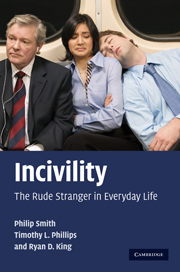Book contents
- Frontmatter
- Contents
- List of figures and tables
- Preface and acknowledgements
- 1 Redirecting incivility research
- 2 The fundamentals of the incivil encounter
- 3 Everyday incivility and the everyday round
- 4 Emotions and sequences
- 5 Gender, age and class: divergent experiences?
- 6 After the event: coping, avoiding and changing
- 7 General attitudes towards the stranger: exploring fear and trust
- 8 How to confront incivility
- 9 Twenty questions and answers
- References
- Index
3 - Everyday incivility and the everyday round
Published online by Cambridge University Press: 05 June 2012
- Frontmatter
- Contents
- List of figures and tables
- Preface and acknowledgements
- 1 Redirecting incivility research
- 2 The fundamentals of the incivil encounter
- 3 Everyday incivility and the everyday round
- 4 Emotions and sequences
- 5 Gender, age and class: divergent experiences?
- 6 After the event: coping, avoiding and changing
- 7 General attitudes towards the stranger: exploring fear and trust
- 8 How to confront incivility
- 9 Twenty questions and answers
- References
- Index
Summary
Our major finding in our previous chapter was the very ordinary quality of incivility. It took place in everyday locations like the supermarket and car park. Rude people were generally not thugs, lurkers or even troublesome teens. They were as diverse in terms of age, gender and appearance as their victims. We also showed that rudeness could be found in a variety of low-level impolite acts. These were not threatening, malicious or crime-related deeds. Finally, a substantial proportion of events involved movement. Put together these clues suggest that rudeness should be studied as a commonplace rather than exceptional act. It is somehow structured into the opportunity spaces of daily life. It is a product of our mundane trajectories through public environments where there are strangers.
Routine activity and predictable incivility
One way to think about this finding is with routine activity theory (Cohen and Felson 1979). Developed in the field of criminology, this shifts our attention away from the study of deviants and offenders towards the analysis of situations and opportunities. The argument is that we can understand certain forms of crime without having to inquire into motivations, or without looking to faulty values and failed socialization for our explanatory context. Arguing that any given crime has to take place at a certain time and at a certain place, routine activity theory asks questions such as: when do victims and offenders come together? At what time of day are guardians away from attractive property? How do people keep safe?
- Type
- Chapter
- Information
- IncivilityThe Rude Stranger in Everyday Life, pp. 41 - 65Publisher: Cambridge University PressPrint publication year: 2010



